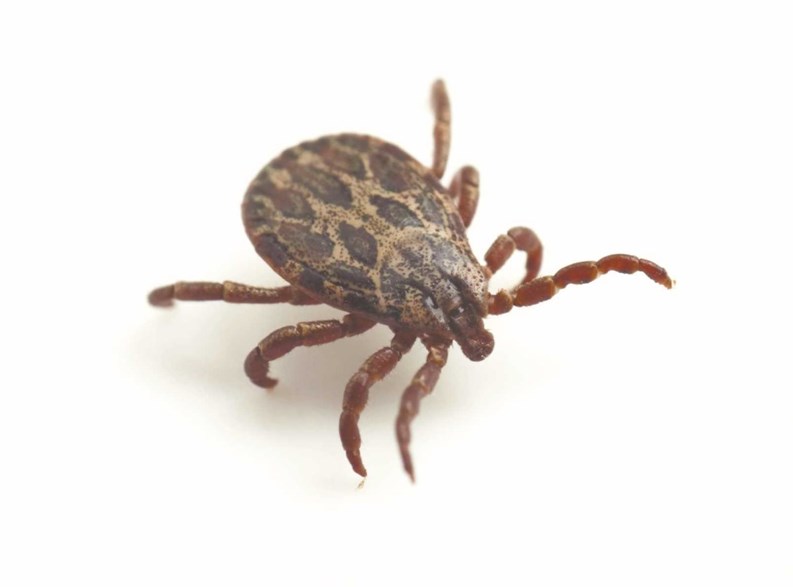New Jerseyans have the most of everything. The highest population density, the densest system of highways and railroads, the most major shopping malls in a 25-mile radius, the most TV reality shows, and even the highest concentration of 24-hour diners.
Disease Carriers
Unfortunately, according to the American Lyme Disease Foundation, New Jersey also has one of the highest deer tick populations and the dubious honor of being among those states having the most reported cases of Lyme Disease. Lyme Disease, with more than 2,000 cases confirmed annually in New Jersey, is a tick-transmitted bacterial infection with debilitating symptoms that can cause a wide array of neurological illnesses including encephalitis. The risk of being bitten by an infected deer tick is greatest in the summer months when the nymph stage is active and people, especially children, are most active outdoors. The deer tick is also a carrier of human granulocytic ehrlichiosis (HGE) and babesiosis. There are two other disease-transmitting ticks in New Jersey: the lone star tick associated with human monocytic ehrlichiosis (HME), and the American dog tick associated with Rocky Mountain Spotted Fever (RMSF), the most common fatal tick-borne disease in the United States.
Ticks are acarines, or small arachnids, closely related to spiders, scorpions, and mites. They are parasites that feed exclusively on blood. Ticks don’t fly, jump or fall from trees; rather, they “quest,” which is perching in low vegetation and waiting for a host to brush by. Once on a host, the tick attaches its hypostome, a fish-hook like piercing clamp, into the host's skin and fills up with blood like a water balloon. Ticks cause diseases because they are not one-way valves. While feeding, it releases some of its own potentially disease-laden blood containing bacteria, spirochetes, rickettsiae, protozoa, viruses, and nematodes. With just a single tick bite, you or a family member can receive a toxic brew of multiple pathogens.
Tick control begins at home. One of the biggest misconceptions about ticks is that you can only get them trudging through deep forests and areas with high vegetation. Studies have shown that about 70 percent of people infected with Lyme disease are bitten by ticks right in their own backyard.
As larvae, ticks feed from small mammals like white-footed mice and meadow voles. The ticks ingest and store infected blood from these reservoir hosts and then progress into their tiny nymph stage. As nymphs, they inhabit vegetation as low as 4-6 inches, vegetation that can be found in anyone’s own yard. This nymph period is especially dangerous because the ticks are so tiny yet still carry potentially infected blood-causing tick-borne illnesses that can be difficult to diagnose and treat.
Control Strategies
For effective tick control and reducing the risk of your family or pets suffering tick bites, homeowners need to implement two related strategies. Both are necessary; one without the other isn’t enough. The first strategy is outdoor habitat modification. You want your lawn and landscaping to be unattractive to ticks. This includes discouraging potential tick-carrying rodents and other hosts from entering your property as well as creating an environment unsuitable for tick survival for those who manage to sneak in. Regularly mow the lawn, trim back overhanging shrubs, limit birdfeeders to winter months, and remove leaf litter, plant debris, and other potential tick harborages.
The second strategy is the prudent use of low environmental impact tick treatments. In residential areas where ticks are abundant, treatments are necessary to reduce tick populations. Tick treatments are amazingly effective when used selectively and intelligently. You want to specifically time and target treatments to those areas where ticks breed and quest rather than just attempting some haphazard application and hoping for the best. A professional pest control firm will maximize the effectiveness of the treatments while using the least amount of product to get the job done. Also, no tick control method is 100 percent effective. Personal protection should always be practiced – even in your own backyard.
Bill Cowley is the owner of Cowley's Termite & Pest Services in Neptune City, New Jersey. The company offers a variety of insect, bird, rodent, and other wildlife removal and pest control services.







Leave a Comment